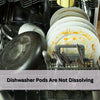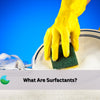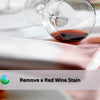How to Remove Grease From Dishes Without Scrubbing for Hours
- by Brodie Cook

Why Is Grease So Hard to Remove From Dishes?
Grease doesn’t just wipe off. It cools down and sticks to pans, plates, and trays. Once dry, it forms a thick layer that adheres to every surface. Add heat, and it gets worse.
When oil splatters in your stove, oven, or fryer, it mixes with crumbs and bits of burnt food. Over time, that mess bakes onto trays, cookware, and utensils. This is where baked-on grease becomes hard to clean.
Many people try to scrub it off, but that takes time. If the grease has dried or settled, it takes even longer. Using steel wool or harsh brushes can scratch your pans or leave marks on non-stick coatings.
A better way to remove grease is to soak it. Let it sit in warm water. This helps loosen the oil and food residue so you can rinse or wipe it off without hard scrubbing.
This approach is supported by research in the Bulletin of the National Research Centre. It shows that natural ingredients can act as a dish degreaser without damaging your cookware.
Is Pre-Soaking Better Than Scrubbing?
If you want to remove grease quickly, pre-soaking is your best option. It works by softening food residue and grease, so it lifts off without heavy scrubbing. This reduces cleaning time and protects your cookware from damage.
Scrubbing with a rag or sponge can remove surface stains, but it doesn’t always break down the deeper layers of gunk. It’s slow and rough on non-stick or coated pans. In some cases, scrubbing just spreads the grease around without actually lifting it.
Pre-soaking lets the grease dissolve in water. Add lemon, vinegar, or toss in a detergent sheet, and let the dishes sit for 15 to 30 minutes. This is long enough to break the bond between the oil and the surface. For stubborn or baked-on grease, soaking for an hour or more can make a big difference.
A test by Breana Lai Killeen, M.P.H, RD, compared soaking and scrubbing. Soaking came out on top. It used less force and worked faster when combined with natural cleaning agents.
If you’re deciding between dishwasher vs hand washing, soaking helps both. It makes it easier to clean greasy items by hand and improves dishwasher results by breaking up the mess before the wash cycle even starts.
What Natural Ingredients Break Down Grease?

You don’t need a chemical spray to clean greasy dishes. Many kitchen-safe ingredients can break down oil, remove food residue, and soften baked-on gunk. These natural degreasers are also safe for the environment and won’t damage your cookware.
Below are some of the best options to use. You can soak dishes in these or apply them directly to greasy spots. Most of them are readily available in your pantry. Others, like soapnuts or shikakai powder, might not be common in but can be found at stores with a natural cleaning section.
Baking Soda Paste: Best for Burnt or Baked-On Grease
- Mix three tablespoons of baking soda with just enough water to form a thick paste.
- Stir until it forms a thick paste
- Spread over greasy pans and plates
- Let it sit for 1–2 hours
- Then scrub away with a soft rag
This method is ideal for oven trays, non-stick pans, and dried leftovers. You can also sprinkle dry baking soda before soaking.
Vinegar Soak: Cuts Through Oily Mess and Smell
- Combine equal parts vinegar and warm water
- Soak greasy dishes for 15–30 minutes
- You can also spray it directly onto stubborn spots
Vinegar helps dissolve oil and remove smells. It works well on glassware, plates, and coated pans. You can boost the effect by adding lemon peel to the soak.
Citrus peel + Bengal gram soak – Natural Oil Cutter
- Add orange or lemon peels to hot water
- Let the mixture sit for 30–60 minutes
- Use the infused water to soak greasy dishes
Citrus peels contain natural oils like d-limonene. These oils help get grease off and leave a fresh scent behind. You can reuse peels from juicing or cooking.
Salt and Lemon Scrub: For Stainless Steel and Cast Iron
- Squeeze lemon juice into a bowl
- Add one tablespoon of coarse salt
- Dip a sponge or cloth into the mix and use it to remove grease
This method works well on tough surfaces that can withstand some abrasion. The salt scrubs gently, and the lemon helps break down oil.
Soapnuts or Shikakai Powder: Gentle Plant-Based Degreaser
- Add a handful of soapnuts to hot water and let them soak
- Or mix shikakai powder with warm water to make a soaking solution
- Use it for glass, metal, and ceramic dishes
Soapnuts and shikakai are traditional Indian cleaning ingredients. They contain natural saponins, which help cut through grease without leaving residue. These are great for individuals who avoid chemical cleaners or have sensitive skin.
Did you know we also use Saponins in our dishwashing sheets?
6 Grease Removal Hacks for Specific Messes
| Grease Type | What to Use | How to Use It | Time Needed |
|---|---|---|---|
| Baked-on grease | Baking soda and water paste | Mix three tablespoons of baking soda with water. Spread as a paste. Let it sit and then scrub away. | 1–2 hours |
| Curry or meat residue | Citrus peel + Bengal gram soak | Add lemon or orange peels to hot water. Mix in Bengal gram. Soak to dissolve food residue. | 30–60 minutes |
| Sticky sauce leftovers | Vinegar spray + warm rinse | Spray vinegar directly on stains. Let it soak. Rinse with warm water. | 15–30 minutes |
| Old pan build-up | Rice husk + hot water soak | Add rice husk to hot water. Soak greasy cookware to loosen stubborn gunk. | 1–3 hours |
| Overnight stains | Tamarind + salt + lemon solution | Mix tamarind paste, coarse salt, and lemon juice. Soak overnight to get grease off. | Overnight |
| General dish cleaning | Dishwashing detergent sheet | Fill sink with warm water. Add one of our sheets. Soak dishes. Wipe away grease and debris. | 15–30 minutes |
Final Steps to Wash Off Grease Without Damage
After soaking, the grease should already be loose. Now it’s time to rinse everything off without creating more mess.
Start by draining the soak water. If there is still visible food residue or an oil film, gently wipe the dish and wash it again. You won’t need to scrub away like before. The soak has done most of the work.
Next, rinse each item with warm water. This helps clear away any remaining grease and washes off ingredients like baking soda, vinegar, or citrus peel. Warm water also helps remove powders like Bengal gram or shikakai more easily.
If needed, wipe stubborn spots with the clean side of your sponge. In most cases, that’s all it takes.
You can also place the dish directly into your dishwasher after soaking. The heat and detergent cycle will handle any last bits of grease without leaving streaks or clogging filters.
Simplest Hack: Use a Dishwashing Sheet
Want a no-fuss way to get rid of grimy dishes without mixing pastes or soaking citrus peels? Just use a dishwashing detergent sheet. It’s a must-have in each kitchen and works as a simple cleaning solution for everyday messes.
Fill your sink with warm water and drop in one Lucent Globe Dishwashing Detergent Sheet. Add your greasy dishes and let them soak for 15 to 30 minutes. The sheet dissolves completely and helps loosen food residue, oil, and debris. After soaking, just wipe away the mess with a soft cloth or sponge.
The formula contains effective, plant-based ingredients:
- Sodium Coco Sulphate – lifts grease from surfaces
- Decyl Glucoside – a mild plant-based cleaner
- Saponins – natural foaming agents that loosen dirt
- Sodium Carbonate – helps soften water and dissolve stains
- Enzymes – break down stubborn food buildup
The sheet can also be used in your dishwasher or added to a dishwand for hand washing. It works in hot or cold water and leaves no sticky film behind.
This is another great option for replacing traditional dish soap. There’s no need to measure liquids, store bulky bottles, or scrub off excess grease for ages.
Here’s a quick tip: For heavy grease, pre-soak with a dishwashing sheet. Then place the item straight into your dishwasher for a fast finish.

 Dishwashing
Dishwashing Laundry
Laundry Bundles
Bundles Toilet
Toilet



